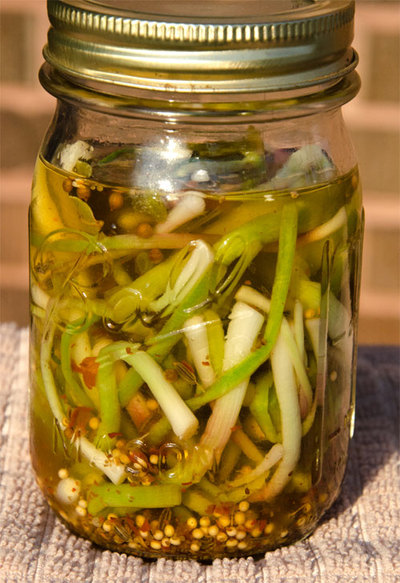
"I give you Chicago. It is not London and Harvard. It is not Paris and buttermilk. It is American in every chitling and sparerib. It is alive from snout to tail." HL Mencken
 According to historians, the river that ran by the native American village near the mouth of the giant lake was lined with wild onions, most likely ramps or wild leeks. In the The Encyclopedia of Chicago, Ann Durkin Keating says "The name 'Chicago' derives from a word in the language spoken by the Miami and Illinois peoples meaning 'striped skunk,' a word they also applied to the wild leek (known to later botanists as Allium tricoccum). This became the Indian name for the Chicago River, in recognition of the presence of wild leeks in the watershed. When early French explorers began adopting the word, with a variety of spellings, in the late seventeenth century, it came to refer to the site at the mouth of the Chicago River."
According to historians, the river that ran by the native American village near the mouth of the giant lake was lined with wild onions, most likely ramps or wild leeks. In the The Encyclopedia of Chicago, Ann Durkin Keating says "The name 'Chicago' derives from a word in the language spoken by the Miami and Illinois peoples meaning 'striped skunk,' a word they also applied to the wild leek (known to later botanists as Allium tricoccum). This became the Indian name for the Chicago River, in recognition of the presence of wild leeks in the watershed. When early French explorers began adopting the word, with a variety of spellings, in the late seventeenth century, it came to refer to the site at the mouth of the Chicago River."
Ramps, like other onions, are an underground bulb with long, tall green grasslike stalks. Ramps are much smaller than leeks, more like scallions, but the leaves are flatter. They are most tender and tasty in spring; and as with robins, when they arrive I know spring is really here. Onion stalks are the first thing edible to push up in spring, and a chomp on raw ramps is my first celebratory rite of spring.
Ramps propagate rapidly, and a handful planted in spring will produce a bucketful by late summer. Like scallions, served raw, they add a pungent bite to salads, and can be stir fried or grilled as a side dish or topping for meats.
When pickled, they are sweet, sour, tangy and a great relish to accompany barbecue and grilled foods. I fell for the pickled ramps Chef Rick Gresh serves at David Burke's Primehouse in Chicago as a side dish with steaks, and I love them in this context. I asked for his permission to publish his recipe and he gave me the go-ahead, with the request that I disclose that his recipe is based on one by eminent Chef Tom Colichio. With his permission, here's Chef Gresh's recipe for pickled ramps, slightly modified by Yours Truly. Try them on a pulled pork sammie or on hot dogs. This recipe also works fine on other onions, sliced vidalias, red onions, Spanish, white, pearl, you name it.
Pickled Chicago (Pickled Onions)
Please note, these are refrigerator pickles, which means they must be kept chilled.
Ingredients
1 pound ramps, including leaves
3/4 cup water
1/2 cup white wine vinegar or distilled vinegar
1/4 cup granulated sugar
1 tablespoon honey
1/2 teaspoon whole mustard seeds
1/2 teaspoon whole coriander seeds
1/2 teaspoon whole fennel seed
1/2 teaspoon whole celery seeds
1/2 teaspoon red pepper flakes
1 whole bay leaf
1/4 teaspoon table salt
Do this
1) Clean the ramps, removing the large green leaves. You can use them in a vegetable dish, or wilt them in a pan and serve them as a topping on meats or other dishes. They're good on pizza or chopped into rice and couscous.
2) Combine everything except the ramps and bring to a boil. Keep the liquid in the hot pan and let it cool for about 30 minutes. Then refrigerate.
3) Boil a pot of water and drop the ramps in for about 20 seconds. This is called blanching and it alters the chemistry of the bulbs, and pastuerizes them. Quickly drain the pot into a colander and run cold water over the ramps for about a minute to shock them and rapidly stop the cooking.
4) Put the ramps in a very clean jar and cover them with the cool pickling liquid. Refrigerate for five days before using, and keep refrigerated for months.
What are you favorite pickles?
All text and photos are Copyright (c) 2012 by Meathead, and all rights are reserved. For more of Meathead's writing, photos, recipes, and barbecue info please visit his website AmazingRibs.com and subscribe to his email newsletter, Smoke Signals.
Friend Meathead on Facebook: http://www.facebook.com/AmazingRibs